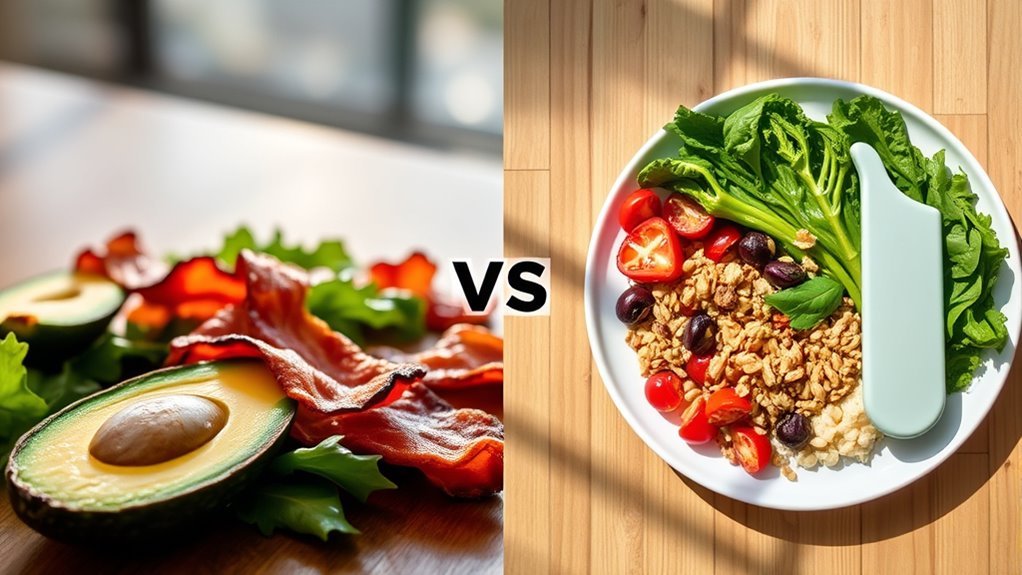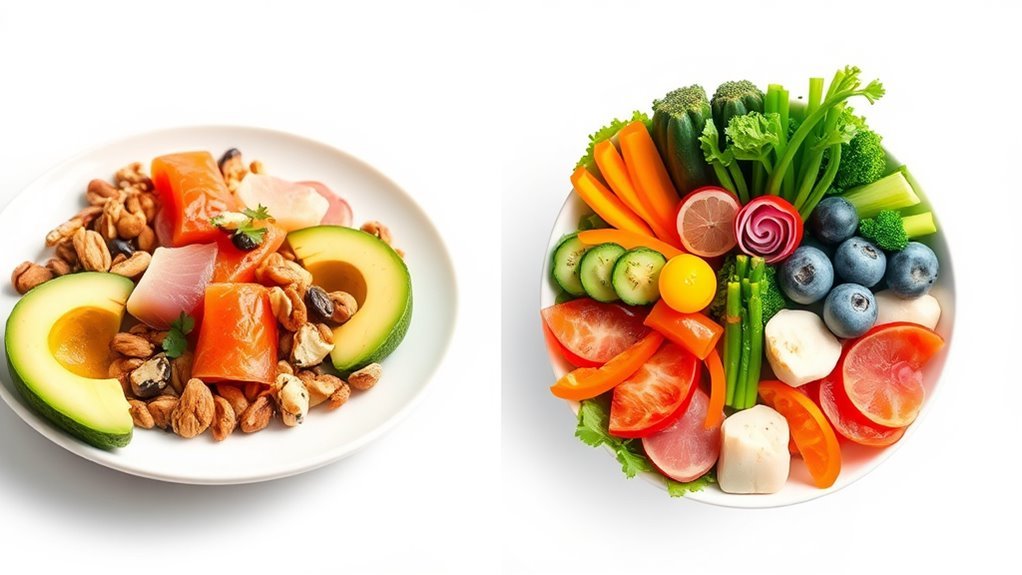Choosing between keto and a calorie deficit really depends on your personal preferences and goals. The ketogenic diet emphasizes high fats and low carbs, promoting fat burning and stable energy levels. Meanwhile, maintaining a calorie deficit allows for more food variety and can be easier to sustain long-term. Both approaches have their pros and cons, so it’s key to find what aligns with your lifestyle. Keep exploring to learn how to best tailor your nutrition for ideal results.
Understanding the Ketogenic Diet

When you consider the ketogenic diet, it’s essential to understand its foundation: a high-fat, low-carbohydrate approach designed to shift your body into a state of ketosis. This dietary framework emphasizes specific macronutrient ratios, typically around 70% fats, 25% proteins, and 5% carbohydrates. By limiting carbs, your body starts burning fat for fuel, leading to various ketosis benefits, such as improved mental clarity and sustained energy levels. You might find this approach liberating, as it encourages you to enjoy flavorful, satisfying foods while still promoting weight loss. However, it’s important to personalize your diet for your unique needs and goals, ensuring you’re not just chasing trends but creating a sustainable lifestyle that works for you.
The Science Behind Calorie Deficit

When you think about weight loss, understanding energy balance is essential. By consuming fewer calories than your body needs, you’re creating a calorie deficit, which can lead to weight loss as your metabolism adjusts. Let’s explore how this science works and how it impacts your journey.
Energy Balance Explained
Understanding energy balance is essential for anyone looking to achieve their weight loss goals, as it fundamentally dictates how your body manages calories. To maintain your current weight, your energy intake has to equal your energy expenditure. In contrast, a calorie deficit occurs when you consume fewer calories than you burn, prompting your body to use stored fat for energy.
| Energy Intake | Weight Maintenance | Calorie Deficit |
|---|---|---|
| Equals Output | Maintains Weight | Promotes Weight Loss |
| Surplus Output | Weight Gain | Not Sustainable |
| Balanced Diet | Healthy Lifestyle | Requires Planning |
Metabolism and Weight Loss
Metabolism plays a pivotal role in how your body processes energy and can greatly impact your weight loss journey. Understanding your metabolic rate is essential for effective weight regulation. Here are some key factors that influence your metabolism:
- Age: As you get older, your metabolic rate tends to slow down.
- Muscle Mass: More muscle means a higher metabolic rate, burning more calories at rest.
- Hormones: Hormonal fluctuations can directly affect your metabolism and energy balance.
- Diet: Your food choices can enhance or hinder metabolic processes.
Pros of the Ketogenic Diet

If you’re considering the ketogenic diet, you might appreciate its potential for improved fat burning and reduced hunger cravings. Research suggests that by shifting your body into ketosis, you can tap into fat stores more efficiently, which may help with weight loss. Plus, many find that the high-fat nature of the diet can lead to fewer cravings, making it easier to stick to your goals.
Improved Fat Burning
While many diets claim to enhance fat loss, the ketogenic diet stands out due to its unique approach of shifting your body into a state of ketosis. This metabolic state encourages your body to burn fat more efficiently, leading to improved fat oxidation. Here’s how keto promotes fat burning:
- Increased fat utilization: Your body adapts to using fat as its primary fuel source.
- Enhanced metabolic flexibility: You can switch between burning carbs and fats more easily.
- Stable energy levels: You won’t experience the highs and lows associated with carb-heavy diets.
- Reduced fat storage: Insulin levels drop, which helps prevent fat accumulation.
Reduced Hunger Cravings
One of the notable advantages of the ketogenic diet is its ability to markedly reduce hunger cravings, making it easier for you to stick to your eating plan. This effect largely stems from its influence on hunger hormones, such as ghrelin and leptin, which play essential roles in appetite regulation. When you shift to a high-fat, low-carb diet, your body enters a state of ketosis, leading to improved satiety and less frequent hunger pangs. As a result, you may find it easier to resist the temptation to snack or overeat. This sense of freedom from constant cravings can be liberating, allowing you to focus on nourishing your body without the stress of incessant hunger.
Pros of Maintaining a Calorie Deficit
Maintaining a calorie deficit can be an effective strategy for weight loss, especially when you take into account how it promotes fat burning while preserving lean muscle mass. By managing your caloric intake, you’re not just losing weight; you’re also improving your overall health. Here are some pros to take into account:
Maintaining a calorie deficit not only aids weight loss but also enhances overall health by promoting fat burning and preserving muscle mass.
- Flexibility: You can enjoy a variety of foods, making it easier to sustain long-term.
- Simplicity: Focusing on portion control can simplify meal planning without complex restrictions.
- Sustainable: Unlike restrictive diets, calorie deficits can fit into your lifestyle without feeling deprived.
- Empowerment: You gain control over your body and health, fostering a sense of freedom in your weight management journey.
This balanced approach can lead to lasting results without sacrificing enjoyment.
Potential Drawbacks of Each Approach
Even with the benefits of maintaining a calorie deficit, it’s important to recognize that every weight loss strategy has its potential drawbacks. For those following a keto diet, nutrient deficiencies can arise due to reduced food variety, potentially leading to health issues. On the other hand, while a calorie deficit can be more flexible, it may not always be sustainable long-term, especially if you struggle with hunger or cravings. Both methods can create challenges that might hinder your weight loss journey. It’s essential to evaluate how these drawbacks align with your lifestyle and goals. Ultimately, finding a balance that allows for flexibility and nutrient-rich foods is key to achieving lasting results without compromising your well-being.
Which Method Fits Your Lifestyle?
How do you decide which weight loss method aligns best with your everyday life? Consider the following factors to find your fit:
- Lifestyle Preferences: Evaluate whether you prefer structured diets like Keto or a more flexible calorie deficit.
- Dietary Flexibility: Think about how much variety you want in your meals. Keto can be restrictive, while calorie counting allows for more choices.
- Personal Goals: Identify your objectives—quick weight loss or long-term sustainability? This influences your choice.
- Social Situations & Meal Planning: Assess how each method impacts your social life and meal prep. A plan that accommodates gatherings is often more sustainable.
Choosing a method that aligns with your life makes the journey enjoyable and effective.
Frequently Asked Questions
Can I Combine Keto and Calorie Deficit for Better Results?
Yes, you can definitely combine keto principles with calorie tracking for better results. By focusing on low-carb, high-fat foods while keeping an eye on your overall calorie intake, you’ll create a balanced approach that suits your lifestyle. This combination allows you to enjoy the benefits of ketosis while ensuring you’re in a calorie deficit. Just remember to listen to your body and adjust your meals and portions as needed to maintain your freedom and satisfaction.
How Do I Know Which Method to Choose?
To choose the right method, consider your personal goals and dietary preferences. If you want to lose weight quickly and enjoy high-fat foods, keto might be appealing. However, if you prefer a more flexible approach without strict food restrictions, a calorie deficit could suit you better. It’s essential to align your choice with what you can sustain long-term, ensuring it fits your lifestyle while still helping you achieve your goals.
Are There Specific Foods to Avoid on Keto?
On keto, you’ll want to avoid foods high in carbohydrates, like grains, sugar, and starchy vegetables. These can hinder your progress by increasing insulin levels and promoting fat storage. Instead, focus on keto foods such as leafy greens, healthy fats, and protein sources. It’s about finding a balance that works for you, allowing flexibility while staying within your carb limits. Enjoy the freedom of choosing delicious options that align with your goals!
How Quickly Can I Expect Results From Either Method?
Imagine planting a seed in your garden. With proper care, you might see sprouts in a week or two. Similarly, with either method, you can expect noticeable weight loss in a few weeks, but results vary. A calorie deficit often yields quicker results, while keto might take longer due to initial water weight loss. Remember, it’s about finding what works best for you and nurturing your progress over time for lasting freedom.
Can I Maintain Muscle Mass on a Calorie Deficit?
Yes, you can maintain muscle mass on a calorie deficit, but it requires careful planning. Focus on muscle preservation by ensuring your protein intake is sufficient—aim for about 1.6 to 2.2 grams per kilogram of body weight. Combine this with strength training to signal your body to retain muscle. Remember, it’s not just about cutting calories; it’s about smart choices that allow you the freedom to enjoy food while achieving your goals.
1. What is the ketogenic diet?
The ketogenic diet, or keto, is a high-fat, low-carbohydrate diet that aims to put the body into a metabolic state known as ketosis. In ketosis, the body burns fat for fuel instead of carbohydrates, leading to weight loss and potential health benefits. The typical macronutrient ratio for a keto diet is around 70-75% fat, 20-25% protein, and 5-10% carbohydrates.
2. How does a calorie deficit work for weight loss?
A calorie deficit occurs when you consume fewer calories than your body needs to maintain its current weight. This prompts the body to use stored fat for energy, resulting in weight loss. Achieving a calorie deficit can be done through dietary changes, increased physical activity, or a combination of both. The key to sustainable weight loss is maintaining this deficit consistently over time.
3. Which is more effective for weight loss: keto or calorie deficit?
Both the ketogenic diet and a calorie deficit can be effective for weight loss, but their effectiveness can vary based on individual preferences and lifestyle. The keto diet often leads to quicker initial weight loss due to water loss and reduced appetite, but a calorie deficit is a more flexible approach that can be tailored to individual dietary needs. Ultimately, the best choice depends on what you can maintain long-term.
4. Are there any health risks associated with the keto diet?
While many people find success with the keto diet, it may not be suitable for everyone. Potential risks include nutrient deficiencies, digestive issues, and an increase in cholesterol levels. Additionally, some individuals may experience the “keto flu,” which can cause fatigue and irritability during the initial transition. It’s crucial to consult a healthcare professional before starting any restrictive diet, especially if you have underlying health conditions.
5. Can you combine the keto diet with a calorie deficit?
Yes, you can combine the ketogenic diet with a calorie deficit to enhance weight loss results. By following the keto diet while ensuring you consume fewer calories than your body burns, you can promote fat loss while still benefiting from the unique metabolic advantages of ketosis. However, careful planning is essential to ensure you meet your nutritional needs while maintaining a caloric deficit.
References
- https://www.ncbi.nlm.nih.gov/pmc/articles/PMC8253384/
- https://www.healthline.com/nutrition/keto-diet-vs-calorie-deficit
- https://www.livescience.com/keto-diet-vs-caloric-deficit.html
- https://www.eatright.org/health/weight-loss/your-health-and-the-keto-diet
- https://www.mayoclinic.org/healthy-lifestyle/nutrition-and-healthy-eating/expert-answers/keto-diet/faq-20459101
- https://www.cdc.gov/healthyweight/losing_weight/index.html
- https://www.who.int/news-room/fact-sheets/detail/healthy-diet


